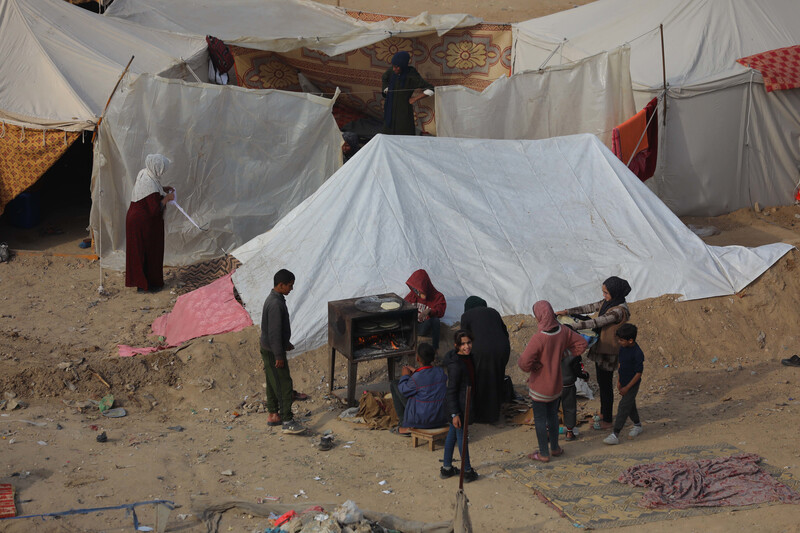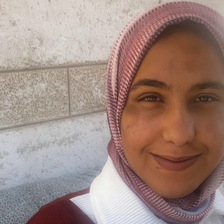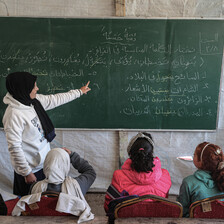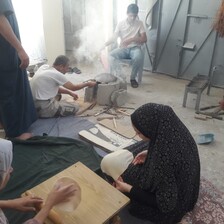The Electronic Intifada 28 December 2023

Displacement means that many people do not have adequate shelter.
APA imagesIsrael has attacked my home during this genocidal war against Gaza.
I wish that I could have cried when I first heard that terrible news. I wish that I could have extinguished the fire inside my heart.
But my tears were dry. My brain refused to believe what had happened.
I still can’t believe that I am homeless in my homeland.
Ahmad – now my husband – started preparing for our marriage when he began working as a teacher in 2019. He had to borrow money from relatives and friends to pay the costs of getting married and making a home together.
Everything we bought for our home has gone. Many of our debts have not been repaid.
Our home was a beautiful apartment in Beit Lahiya, northern Gaza.
I loved receiving visitors.
I would sit with them on the sofa and have sweets, nuts, drinks. Sometimes lunch.
We slept peacefully in our bedroom.
In the living room, we would play with our baby son Majd, often surprising him with gifts of new toys.
The kitchen was my own little world. I experimented by making many dishes for the first time.
Some were a success, others a failure.
Ahmad and I would cook, eat and wash the dishes together.
Majd would crawl around everywhere. We had to keep an eye on him so that he wouldn’t break glasses.
Israel has turned everything into dust.
Ahmad and I got married in March 2022. The celebrations lasted for three days.
We kept mementoes of our wedding party in our home.
Everything has now been destroyed.
Literally everything.
The white dress that I wore.
Ahmad’s black suit.
Recordings of the event.
All the gifts Ahmad had given me.
Pictures of us together.
A painting embroidered with lyrics from our favorite song.
Shortage of food and clothes
I have now brought Majd to my grandmother’s home in Rafah, Gaza’s southernmost city. This is the seventh place where we have taken shelter since 7 October.
There are 12 families staying in my grandmother’s home. More than 50 people have to share three bathrooms.
Every day my brother and my nephews have to fetch water and bring it into the house.
We have no electricity or fuel.
I miss being able to have a hot shower whenever I want.
My mom and sisters spend hours every day cooking on a fire. They have to burn wood, cardboard and paper.
With a huge number of displaced people in Rafah, the markets are overcrowded and winter clothes are scarce.
I have struggled to find any clothes for my son.
The only jacket I could find cost nearly $20. Before the war, it would have cost about $8.
I am finding it hard to provide my son with basics like diapers, eggs and milk.
The price of almost all vegetables, fruit and meat is several times higher than it used to be. That’s if they are available.
Many of Gaza’s workers have not been paid wages since the war began. They cannot afford to pay the high prices now being charged.
We are eating more canned foods than normal. I can feel that this change of diet is having an adverse effect on my digestive system.
The weather is bad. Majd and I have both had colds.
I’ve gone to see a doctor, who told me that stress is weakening immune systems.
There is a shortage of medicines in clinics and in pharmacies.
No news of my husband
I miss Ahmad, my husband, dearly. I am also proud of his steadfastness.
He refused to leave Beit Lahiya. At first, he stayed in his grandfather’s home, which is close to our apartment.
Ahmad and I used to be able to chat on a video call every day.
But as the Israeli tanks got closer to Ahmad, he was forced to move after nearly 60 days of this war. He went to stay with his aunt.
More than 30 other relatives had moved there.
One morning after he had moved to his aunt’s home, Ahmad felt he was being suffocated with a dark fog. There was glass all over his body.
One of the neighbor’s homes had been attacked by the warplanes in Israel’s arsenal. A number of people were killed, others were wounded.
So everyone taking shelter in his aunt’s home had to move and stay with another relative.
Some of Ahmad’s neighbors have been staying at schools in Jabaliya refugee camp. Israel has arrested some of his nephews.
It was Ahmad’s birthday recently. Because of a communications blackout, I wasn’t able to call him.
I have no news about him at the moment.
Baby without his dad
I gave birth to Majd on 30 December last year. He was the cutest baby ever.
We have watched Majd grow every day. I cannot imagine life without him.
If we were feeling down, Majd would laugh and cheer us up.
Raising a child with Ahmad was exciting. We used to celebrate a little at the end of each month as Majd was now a month older.
Because of this horrible war, Ahmad hasn’t been able to see Majd walking his first steps.
Ahmad hasn’t been around to hear Majd say “Baba” (dad) and “Mama.”
Majd has started to eat by himself, dance when he hears songs, clap his hands and to imitate adults. His father hasn’t been able to see him doing these things.
I never imagined that Ahmad would have to miss seeing these developmental stages.
When I look at and listen to Majd – his eyes, his laughter, the way he moves – I’m reminded of Ahmad. Majd bears a very strong resemblance to his dad.
Majd is helping me to get through these difficult times.
I used to cry because Ahmad wasn’t beside me. Now I just hope that he is safe, that he has enough to eat and clean water to drink.
Home is not simply a patch of land, with stones placed on top of each other. It’s not just a few rooms.
It cannot be reduced to concrete or something material.
It is a collection of memories and emotions. It is a part of me.
Whenever Ahmad and I would enter our apartment after being away from it, we would say “home sweet home.”
Two months have passed since we were last in our home. If I ever get back there, I know there will be nothing sweet about it.
Now I am just hoping that I can stay alive with my baby and be reunited with my husband – even if we have to live in a tent on the rubble of our home.
Hanin A. Elholy is a researcher, writer and translator based in Gaza.





